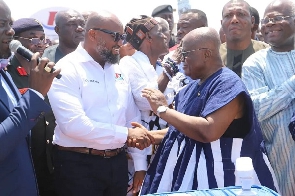 President Nana Addo Dankwa Akufo-Addo and Dr Daniel McKorley
President Nana Addo Dankwa Akufo-Addo and Dr Daniel McKorley
The newly established industrial salt production plant worth US$88million at Ada in the Greater Accra Region holds potential to become the country’s leading export commodity to the African market under the Africa Continental Free Trade Area (AfCFTA) arrangement, says its owners.
The project is estimated to yield about US$2billion to the economy in the short-to-middle-term, which will make salt – once upon a time known as ‘white gold’ – one of Ghana’s major sources of foreign exchange by 2026 under AfCFTA when the Ada Songhor Salt project – owned by Electrochem, a subsidiary of the McDan Group of Companies – is fully completed.
With an initial production capacity of one million metric tonnes of salt per year, the project is to be scaled up to about two million tonnes by 2025. The concession meanwhile holds an ultimate capacity of 15 million tonnes per year when all phases are fully completed.
With salt identified as a critical commodity for food security and industrialisation of the African continent, the 15 million capacity long-term target is projected to feed the demand of most countries on the continent – with Ghana and Senegal standing tall as the only countries with natural salt minerals in West Africa.
Minister of Trade and Industry Kobina Tahir Hammond mentioned at the launch that the project is capable of yielding about US$2billion to the Ghanaian economy in the short-to-middle-term, with a potential of creating more than 10,000 direct and indirect jobs in the near-future.
According to him, Nigeria – one of the leading consumers of salt on the continent, imports in excess of 1.5 million metric tonnes per annum with over 80 percent of its industrial salt needs coming from Brazil, adding that Electrochem must take steps to penetrate the Nigerian market.
Chairperson-McDan Group of Companies, Daniel McKorley, in an interview with B&FT described the Electrochem project as a game-changer in the quest to grow the economy.
“With deliberate efforts and the right financial facility, we can easily scale up this project to the 15 million m/t per annum in five years. With the completion of this phase one, we are currently creating about 3,000 jobs. And the most important thing is that it doesn’t require a degree to work here; this is the kind of job that members of this community need. About 98 percent of the workforce here will not require a degree to work, and that is what creating jobs means for a country like Ghana,” he said.
He explained that the project’s first phase is production of salt, while the second phase is establishing a world-class salt refinery and the third involves a chlor-alkali plant for the highest level of industrial demands.
“AfCFTA is a huge market. It has given us a door into the African market, and McDan has been a pioneer since trading started… every industry needs salt, and salt has over 14,000 uses. It’s a critical resource for the manufacturing industry; even the recent COVID-19 vaccines from Morrocco relied on salt, so the potential to grow industries and our economy is enormous,” he stated.
Mr. Mckorley appealed to government for support regarding investments and development of supporting basic infrastructure. “We humbly request government to build the Ada West jetty, which is crucial for our expansion plans as well as the road network in the Ada area to aid transportation of products.”
Community impact
As an organisation in tune with environmental, social and governance (ESG) policies, Electrochem said it is concerned about sustainability of the local communities around its operational area; and as such has created over 70 mine banks for seven communities along the Songor Lagoon, with each community having the capacity to produce 260,000 tonnes of salt per each harvest season.
McDan emphasised that his plans for development of human capital and socioeconomic empowerment of the Ada communities will be incomplete without the establishment of a Chemical Research University in Ada.
The salt concession covers an area of approximately 41,000 acres, lying within the jurisdiction of both the Ada East and Ada West local government administrative districts of the Greater Accra Region. The project, in terms of acreage, is the largest in Africa but has been lying dormant as an industrial salt-producing area since 1982.
Paramount Chief of the Ada Traditional Area, Djetse Nene Abram Kabu Akuaku III, in his address said the Ada Traditional Council is filled with immense gratitude for the salt mine and processing plant’s establishment – lauding the investment and development they will bring to the area.